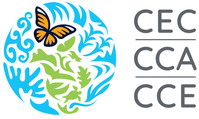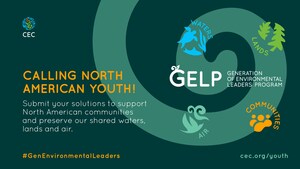The CEC announced 15 North American environmental justice and climate resilience projects to receive inaugural EJ4Climate grant.
MONTREAL, March 24, 2022 /PRNewswire/ - The North American Commission for Environmental Cooperation (CEC) has announced 15 climate-focused projects to receive an Environmental Justice for Climate ('EJ4Climate') grant. The CEC's first USD$2 million EJ4Climate grant program is aimed at supporting efforts made towards environmental justice and climate resilience for communities across North America.
The EJ4Climate grant program, launched by U.S. Environmental Protection Agency Administrator Michael S. Regan at the 28th annual CEC Council Session in September 2021, provides funding directly to local and Indigenous communities and community-based organizations in Canada, Mexico and the United States, helping advance local solutions and promote shared responsibility and stewardship for the environment.
"It has been heartening to see the enthusiastic response to the EJ4Climate grant program from communities across North America. We are inspired by the level of innovation, creativity and passion demonstrated by each community," said Richard Morgan, CEC Executive Director. "As our countries and communities work to mitigate and adapt to a changing climate, it is vital to help drive actions that directly support underserved and vulnerable communities, and Indigenous Peoples, on the front lines of climate change. We congratulate the first EJ4Climate grant recipients and look forward to seeing the progress they will bring to their communities."
The EJ4Climate selection committee selected the 15 grant recipients from over 375 proposals received from across Canada (57), Mexico (144) and the United States (174). The proposals were evaluated on specific criteria including the degree of community involvement and partnership, plan implementation, and measurable objectives and activities over the course of the project life cycle. Projects will be implemented by February 2024.
The complete list of EJ4Climate winning recipients and their projects includes:
Canada
- Community-led Climate Solutions for Vertical Communities, Toronto Environmental Alliance, Toronto, Ontario
- Dene Béré Harvesting Programs for Women and Youth, Sahtú Renewable Resources Board, Tulita, Northwest Territories
- Gitga'at Seafood Safety and Food Sovereignty in the Context of Climate Change, Gitga'at First Nation, Hartley Bay, British Columbia
- Resilient Waters, Watershed Watch Salmon Society, Vancouver, British Columbia
- Seeding the Future – Adaptation to Climate Impacts through Healthy Ecosystems and Traditional Plants in the Piikani First Nation, The Resilience Institute, Canmore, Alberta
Mexico
- Community Mangrove Restoration and Regenerative Ecotourism, Fondo Oaxaqueño para la Conservación de la Naturaleza (FOCN), Puerto Escondido, Oaxaca
- Community Participation in the Development of Climate Change Resilience Strategies for Coastal Areas, Paisajes y Personas Resilientes A.C., Xalapa, Veracruz
- Environmental Restoration Strategies to Increase Resilience in Rural Areas that are Extremely Marginalized, Guacamayas Calentanas A.C., El Chocolate, Churumuco, Michoacán de Ocampo
- Rural Women Leaders in the Adaptation to Climate Change, El Consejo Civil Mexicano para la Silvicultura Sostenible, Ciudad de México, México D.F.
- Women Saving to Confront Climate Change, KO´OX TANI Fundación para el desarrollo comunitario y la inclusión social, A.C., Mérida, Yucatán
United States
- Marsh Restoration at Grand Bayou Indian Village, Common Ground Relief, New Orleans, Louisiana
- Seeding Resilience in Princeville II: Community-driven Adaptation to Climate, Conservation Trust for North Carolina, Raleigh, North Carolina
- Silver City Carboneers, Upper Gila Watershed Alliance, Silver City, New Mexico
- Sustainable Ecosystems and Resilient Economies through Mariculture, Native Village of Eyak, Cordova, Alaska
- Turner Station Witness Trees, Greater Baltimore Wilderness Coalition, Baltimore, Maryland
Learn more about the EJ4Climate grant program, grant recipients and the work they are doing to address the impacts of climate change by visiting www.cec.org/ej4climate.
About the CEC
The Commission for Environmental Cooperation (CEC) was established in 1994 by the governments of Canada, Mexico and the United States through the North American Agreement on Environmental Cooperation, a parallel environmental agreement to NAFTA. As of 2020, the CEC is recognized and maintained by the Environmental Cooperation Agreement parallel to the new Free Trade Agreement of North America. The CEC brings together a wide range of stakeholders, including the general public, Indigenous People, youth, nongovernmental organizations, academia, and the business sector, to seek solutions to protect North America's shared environment while supporting sustainable development for the benefit of present and future generations. Find out more at: www.cec.org.
The CEC is governed and funded equally by the Government of Canada through Environment and Climate Change Canada, the Government of the United States of Mexico through the Secretaría de Medio Ambiente y Recursos Naturales, and the Government of the United States of America through the Environmental Protection Agency.
SOURCE Commission for Environmental Cooperation

WANT YOUR COMPANY'S NEWS FEATURED ON PRNEWSWIRE.COM?
Newsrooms &
Influencers
Digital Media
Outlets
Journalists
Opted In






Share this article